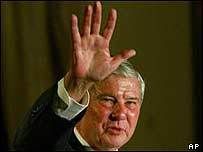
From ThinkProgress.org:
Former Senate Intelligence Committee Chairman Bob Graham (D-FL) was one of 23 Senators to have voted against the Iraq war resolution in October 2002. “With sadness,” he told his colleagues, “I predict we will live to regret this day, Oct. 10, 2002, the day we stood by and we allowed these terrorist organizations to continue growing in the shadows.”
Just four months after Bush launched the Iraq war, Graham floated the idea of impeachment. “Clearly, if the standard is now what the House of Representatives did in the impeachment of Bill Clinton, the actions of this president [are] much more serious in terms of dereliction of duty,” he said. In an interview this week with ThinkProgress, Graham said he stood by his 2003 statement:
How many Americans would say that it is a greater dereliction of duty as President of the United States to have a consensual sexual affair or to take the country to war under manipulated, fabricated, and largely untruthful representations which the President knew or should have known. I think the answer to that question is clear.
Graham added that it’s unlikely Bush would be impeached, explaining that he learned the word impeachment is an “incendiary word” that Americans shy away from. “Americans don’t like impeachment because it connotes the kind of instability that so many other countries around the world have known.” But he added that his original remark regarding impeachment “was a truthful statement at the time and it’s even more truthful today.”
CLICK HERE TO LISTEN
Right before the Senate vote on the Iraq resolution, the mild-mannered Graham sounded the alarms in unusually stark language. “If you believe that the American people are not going to be at additional threat,” he said, “then, frankly, my friends — to use a blunt term — blood is going to be on your hands.”
Asked to reflect on that statement today, Graham said, “There are 3,500 fewer American servicemen alive today in the world since the day I made that statement. There are tens of thousands of civilians who’ve lost their lives. The United States is at dramatically greater risk of terrorism… So I’m afraid that the blood has flown fuller, deeper, and redder that I thought it was going to.”
Graham also ridiculed Sen. Joseph Lieberman’s (I-CT) calls for taking “aggressive military action” against Iran:
I don’t know where we’re going to get the troops to take aggressive offensive action against Iran. Iran’s a country that’s approximately 2.5 times the population of Iraq. It has a GDP that’s twice that of Iraq. It is a much more significant force in the world. And we see how bogged down we are in Iraq, how in the world are we going to even consider using massive military force against Iran?
'Impeachment' is an incendiary word that Americans shy away from because of the way that Republicans used it against Clinton - as a device to stop legislation by Democrats from going forward and becoming law.
Before the midterm elections, polls indicated that the majority of Americans favored impeaching Bush. I haven't seen any polling on that question since the elections, but Bush's approval ratings haven't improved - they've sunk to Nixon's lowest numbers. I think it's a safe bet to conclude that even more people support impeachment.
The only thing preventing impeachment is Congress. The question then becomes, "Why?" Are they lazy? Are they being blackmailed by information culled from one of the many secret surveillance programs that Bush-Cheney are operating outside of the law and judicial oversight?
Could it also be that a deal was made last year? That if the Democrats prevailed in the midterm elections and became the majority in the House, Republicans and Democrats would agree to a woman (Pelosi) becoming the first woman Speaker if Democrats dropped all plans to impeach Bush and Cheney? Because if both the President and Vice President were impeached, the Speaker of the House (Pelosi) would be next in line to become President. And that if a woman is to ever become President of the United States, it must be through a direct vote of the people.
What else could explain Pelosi's announcement ("taking impeachment off the table") before the midterm elections?

If I'm right, we traded letting Nancy Pelosi become the first woman Speaker of the House of Representatives for allowing the most corrupt, thieving, murderous administration in the history of the nation remain in power, so that they could continue their assault on the Constitution, on civil liberties, rendition, torture, promote their preemptive war policies (for oil and other profiteering), attack Iran and expand the hostilities in the Middle East and around the world.
I can't think of any other reasons to explain all that this Democratic Congress has failed to do. How many times must Rove and Gonzales and Rice (and Bush, Cheney, Secret Service) ignore subpoenas, refuse to appear or produce documents before you go to court to compel compliance? How can anyone explain a Democratic Congress allowing the Bush administration's failure during Hurricane Katrina to go uninvestigated?
If Congress did proper oversight, all investigations of everything that Bush-Cheney have been up to these last six+years lead to misfeasance, malfeasance, corruption and impeachment. Why wouldn't the Democrats (who are not stupid and just as politically motivated as Republicans) jump at these opportunities to score points at Republicans' expense?
Something is preventing the Democrats. What?

